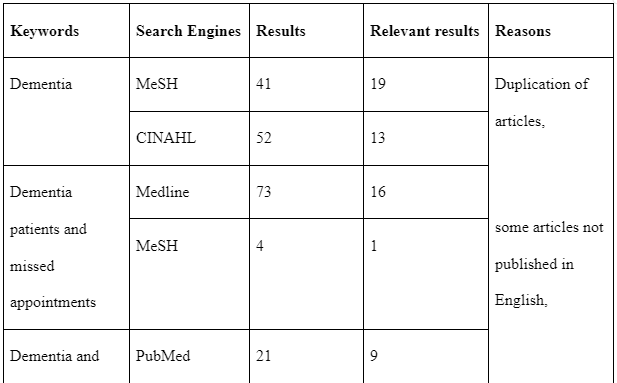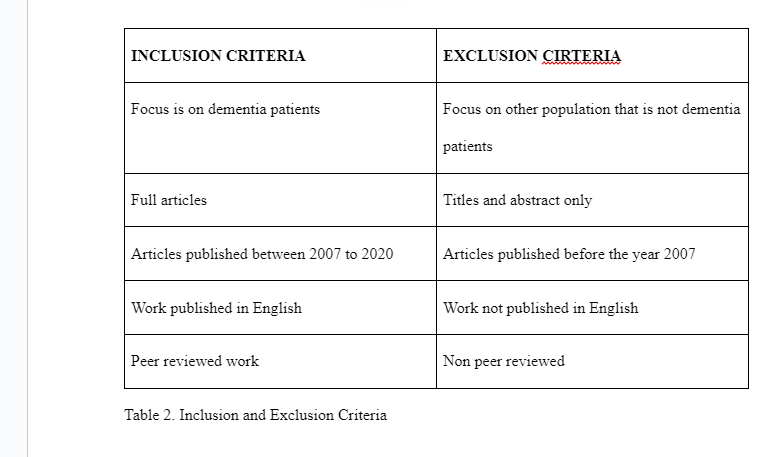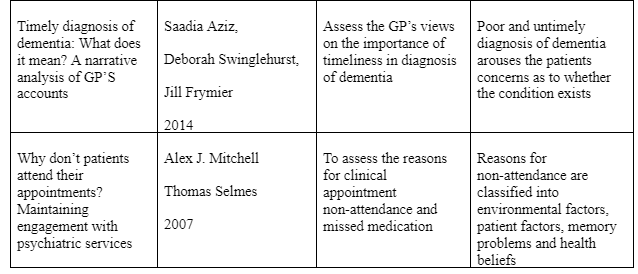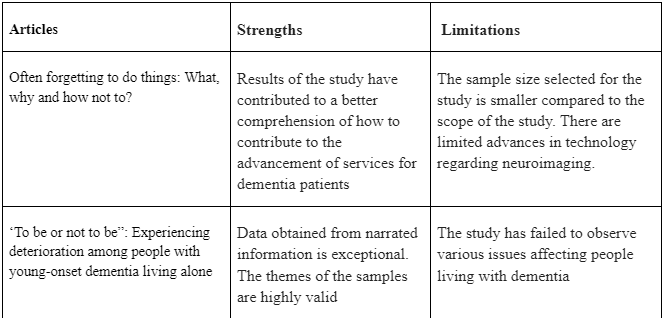Patients Diagnosed with Dementia
BACKGROUND
Across the globe, there are about 35 million people diagnosed to have dementia. This data has been predicted to increase to 66 million by 2030 and 115 million by 2050 (Chiao et al., 2015). Dementia is a continuous illness in which the brain is diseased and causes disruption of various higher cortical functions like understanding, thinking, judgement, language, memory and learning capability (Groot et al., 2016). This condition mostly affects the elderly and deteriorates with time. The most likely cause of dementia is Alzheimer’s Disease (AD), though other causes could be Frontotemporal dementia (FTD) and Vascular dementia (VAD) are prevalent (Achterberg et al., 2013) . .

METHODOLOGY
The main aim of this review is to evaluate reasons why patients diagnosed with dementia avoid attending the dementia appointments
This study extensively utilized electronic databases like Medline, CINAHL, MeSH and PubMed, alongside other sources of information like semantic scholar and google scholar to obtain data that is relevant to the topic. The search was restricted to the period of 2007 to 2020 for literature that had been published in English. This search was done systematically to enable convenient recognition and excerption of relevant and up to date published work.
There was the use of Key Words like dementia, patients and appointments. The Boolean term (AND) was used to combine keywords to filter the search to relevant findings as shown in table 1 below: .’



Table 1. Keywords used in the search, the electronic search engines utilized and relevant results obtained Search Findings From the search results, 1,604 articles were obtained out of which only 201 were reviewed at full text level. After excluding work that did not meet the inclusion criteria as shown in the table 2. below and removing duplicates, 22 articles were identified that are relevant to the study. From the 22 findings, 5 articles were carefully selected for a deeper review as they were critically appraised topics that had undergone through evaluation.

Hierarchy of evidence
This section describes the hierarchy of evidence of the selected studies. From the 5 articles, two were systematic reviews and had applied quantitative research methods in which at least two randomized controlled trials were conducted on the sampled population to obtain the desired results. This is categorized as level I according to (Lee, 2019). The three remaining articles fall under level v since they were qualitative research studies and obtained their findings from primary methods of data collection like interviews, Focus group discussions and questionnaires.
From the search, the findings for not attending the clinic appointments were classified into three categories. These are: patient factors (n=3); demographic or environmental factors(n=1) and information and health beliefs (n=1). These will be expounded on in the discussion section.
The table below shows the details of the characteristics of the five studies obtained from the search, including the aims and the findings of the studies.




DISCUSSION
From the findings, the reasons for not attending appointments were classified into three. The patient factors include: forgetfulness by the patient (Shum, 2014), being too anxious to visit the clinic, missing the date of appointment or oversleeping on the actual date of visitation (Mitchelle & Selmes, 2007). On the demographic or environmental factors these issues arose: homelessness; lack of money or medical insurance where health services were not free; the medical facility being too far from the patient and/or lack of transport made accessing the facility difficult (Shum, 2014); lack of personalized care at home that ensures the patient attends all medical appointments (Johannessen et al., 2018). Information and health beliefs include: Lack or poor communication from the medical institutions to the dementia patients; getting the appointment letter too early that the patient forgot on the actual day(Harte et al., 2017); not educating the patients on the severity of the condition and the consequences of missing an appointment, therefore, the condition is not taken seriously by the patient (Mitchell & Selmes, 2007) and poor or untimely diagnosis which arouses the curiosity of the patient as to whether the condition really exists (Saadia et al., 2014) This lack of attendance had severe consequences on the patients and the medical attendant in charge of the patient. These include; rehospitalization of the patient, rapid deterioration of the condition (Edwards et al., 2014), poor quality of life and skipped medications (Knolhoff et al., 2016). on the other hand, medical attendants become increasingly frustrated with patients who skip appointments and they develop a negative attitude, this creates a drop in the levels of empathy provided by the medical staff and reduced communication. Contact between the dementia patient and the respective health provider is therefore gradually reduced (Pathak & Montgomery, 2015) Possible interventions towards the issue of missed appointments by the dementia patients include: putting in place support systems especially personalized care that will ensure the patient does not skip any clinical visits and also ensure that daily activities run as normally as possible
(Edwards et al., 2014); Proper and timely diagnosis of the patients to avoid arousing any questions by the dementia patient or the patient’s family towards the existence or the significance of the condition; institutions to enhance their appointment reminder systems and ensure that the letters get to the patients in time and reminders to be sent as often as possible (Harter et al., 2017); for cases where the health facility is distant, the institution could provide a means of transport or refer the dementia patient to a nearby medical facility (Jonsson, 2018); educating the patients and their families on the importance of the visits and the significance of the condition. Health facilities having follow up services to check on the possible reasons for missed appointments (Mitchell & Selmes, 2007) The selected five studies provided different findings as each of them had aims that were slightly different as illustrated in table 3. The methods of data collection and analysis also differed from study to study and the populations of interest were also different. Despite of this, the studies provided reliable data as the research questions were clear in providing information about the aims and were well answered by the research designs applied in the studies. The samples chosen were representative of the studies apart from the one conducted by Shum (2014) which had a small sample size. All in all, they yielded reliable results that when combined answered the aims of this study. The discussion and conclusions of the studies were consistent with the results obtained and also the strengths and limitations were provided in the various studies.
PROJECT RESEARCH AIM
The main aim of the research project is to assess the reasons for lack of attendance of clinical appointments by dementia patients. The objectives of the project:
The reasons for dementia patients not attending for the medical appointments The consequences of not attending medical appointments by dementia patients The possible solutions to the missing of medical appointments by dementia patients
PROJECT PLAN
The study will utilize a qualitative approach. As an explorative study the qualitative approach will help in providing an insight into the reasons or motives behind the missing of appointments by dementia patients (Umanailo et al., 2019). A qualitative research method collects information that is non-numerical which helps in providing evidence for the behaviour or perception of a target sample population (Cohen et al., 2013). There will be use of questionnaires, and Focus Group Discussions to collect data from the population of interest. In this case, the dementia patients, their caregivers, the family and the concerned medical attendants will be the population of interest. This will allow the participants to openly and fully express their concerns regarding the topic. Content and narrative analysis will be utilized for the analysis of qualitative data. The data obtained will give an insight to the reasons for missed medical appointments by dementia patients, the consequences and possible solutions to the issue.

REFERENCES
- Achterberg, W. P., Pieper, M. J., van Dalen-Kok, A. H., De Waal, M. W., Husebo, B. S., Lautenbacher, S., ... & Corbett, A. (2013). Pain management in patients with dementia. Clinical interventions in aging, 8, 1471.
- Bryman, A. (2016). Social research methods. Oxford university press. Chiao, C. Y., Wu, H. S., & Hsiao, C. Y. (2015). Caregiver burden for informal caregivers of patients with dementia: A systematic review. International nursing review, 62(3), 340-350.
- Cohen, L., Manion, L., & Morrison, K. (2013). Research methods in education. routledge. Edwards, R., Voss, S., & Iliffe, S. (2014). Education about dementia in primary care: Is person-centredness the key? Dementia, 13(1), 111-119.
- Groot, C., Hooghiemstra, A. M., Raijmakers, P. G. H. M., Van Berckel, B. N. M., Scheltens, P., Scherder, E. J. A., ... & Ossenkoppele, R. (2016). The effect of physical activity on cognitive function in patients with dementia: a meta-analysis of randomized control trials. Ageing research reviews, 25, 13-23.
- Harte, E.M., MacLure, C., Martin, A., Saunders, C.L., Meads, C.A., Walter, F.M., Griffin, S.J., Mant, J., & Usher-Smith, J.A. (2017). Reasons why people do not attend NHS Health
- Checks: a systematic review and qualitative synthesis. The British Journal of General Practice, 68, e28 - e35. Johannessen, A., Engedal, K.A., Haugen, P.K., Dourado, M.C., & Thorsen, K. (2018). “To be, or not to be”: experiencing deterioration among people with young-onset dementia living
- Harte, E.M., MacLure, C., Martin, A., Saunders, C.L., Meads, C.A., Walter, F.M., Griffin, S.J., Mant, J., & Usher-Smith, J.A. (2017). Reasons why people do not attend NHS Health Checks: a systematic review and qualitative synthesis. The British Journal of General Practice, 68, e28 - e35.
- Johannessen, A., Engedal, K.A., Haugen, P.K., Dourado, M.C., & Thorsen, K. (2018). “To be, or not to be”: experiencing deterioration among people with young-onset dementia living alone. International Journal of Qualitative Studies on Health and Well-being, 13.
- Jónsson, P. V. (2018). Dementia Assessment. Middle East Journal of Age and Ageing, 83(6018), 1-2. Kable, A., Chenoweth, L., Pond, D., & Hullick, C. (2015). Health professional perspectives
- systems failures in transitional care for patients with dementia and their carers: a qualitative descriptive study. BMC Health Services Research, 15.
- Knolhoff, J. B., Djenic, B., Hsu, C. H., Bouton, M. E., & Komenaka, I. K. (2016). Missed appointments in a breast clinic: Patient-related factors. The American journal of the medical sciences, 352(4), 337-342.
- Lee, M. S. (2019). Gaps of perception on evidence and the role of systematic reviews in evidence-based medicine. Integrative medicine research, 8(2), 131.
- Mitchell, A.J., & Selmes, T. (2007). Why don't patients attend their appointments? Maintaining engagement with psychiatric services.
- Pathak, K. P., & Montgomery, A. (2015). General practitioners’ knowledge, practices, and obstacles in the diagnosis and management of dementia. Aging & Mental Health, 19(10), 912-920.
- Umanailo, M. C. B., Hamid, I., Hamiru, H., Assagaf, S. S. F., Bula, M., Nawawi, M., ... & Bon, A. T. (2019). Utilization of Qualitative Methods in Research Universities. Education science, 21(36), 20.
- Whittaker, E., Swift, W., Flatau, P., Dobbins, T., Schollar-Root, O., & Burns, L. (2015). A place to call home: study protocol for a longitudinal, mixed methods evaluation of two housing first adaptations in Sydney, Australia. BMC public health, 15(1), 342.


Continue your journey with our comprehensive guide to Pain Tolerance and Threshold in Athletes.
- 24/7 Customer Support
- 100% Customer Satisfaction
- No Privacy Violation
- Quick Services
- Subject Experts



